This is a page within the www.staffshomeguard.co.uk website. To see full contents, go to SITE MAP.
MEMORIES
AND INFORMATION - WARWICKSHIRE
43rd
WARKS. (BIRMINGHAM) BATTN.
and
THE AUSTIN WORKS,
LONGBRIDGE
|
The
Longbridge
and Rubery area, on the south-western outskirts of
Birmingham, was defended by the
43rd Warwickshire
(Birmingham) Battalion under the command of
Lt.-Col.
A.F. Lovell. Within that Battalion served the unit,
almost certainly of full Company strength, which was
responsible for the huge Austin works at Longbridge.
Its membership would have been made up entirely from
Austin employees, devoting much of their spare time,
in evenings and at weekends, to Home Guard duties
after long days at work.
N.B. This page of the
website includes information on members of the 43rd
Warwickshire in general. Many of those mentioned were
definitely members of the Austin Works Company but others may
or may not have been.
Below is an
excellent group image showing what must be the entire
Austin Company, one of the several which constituted
the 43th Warwickshire Battalion. The precise
location of the photograph is so far unidentified but
it was clearly at a location within the factory. The
date and occcasion are similarly unknown but are
likely to be one of the fairly rare times when the
whole Battalon came together - possibly a ceremonial
parade, perhaps to celebrate one of the anniversaries
of the founding of the service in May 1940 or to
support one of the fund-raising weeks such as Salute
the Soldier or Wings for Victory. It may even
mark the stand-down of the Home Guard which occurred
in early December 1944 and was celebrated by parades
and march-pasts by every battalion in the country. It
is unlikely to date before mid-1943.
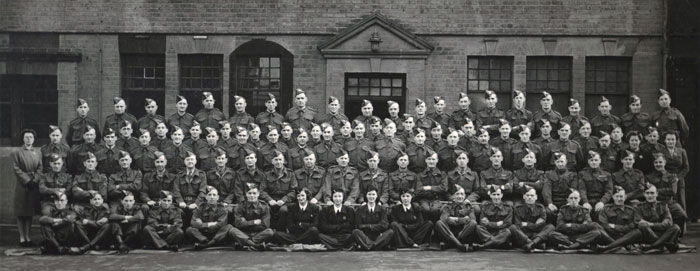
Please click on the
image to see a magnified version
n.b. There is further comment on the above
image, including identifications, in an associated website page,
here.
The following image
probably shows one of the constituent platoons of
the Works Company and may well show men who appear
above.
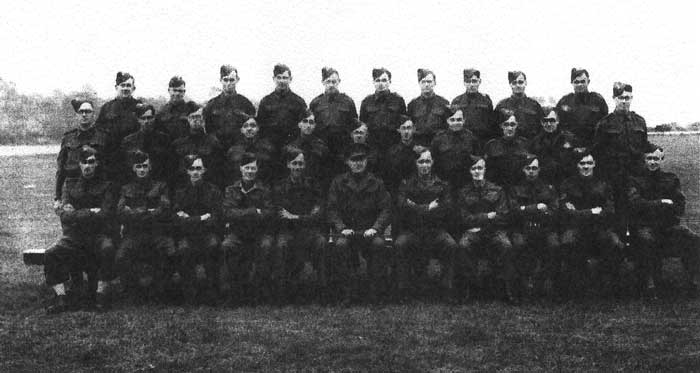
Three views of a parade, very probably the same one. It took place in
1941 and almost certainly marked the first
anniversary of the founding of the service,
in May 1940. It is headed by the Battalion
band, the men are fully uniformed, smart and
in step. Some weaponry is evident; what
cannot be seen is the previous twelve months
of intensive infantry training which means
that the Battalion has already developed
into a force to be reckoned with.
The
first view is in Longbridge Lane
with the
Bristol Road South and the
West Works in the
background.
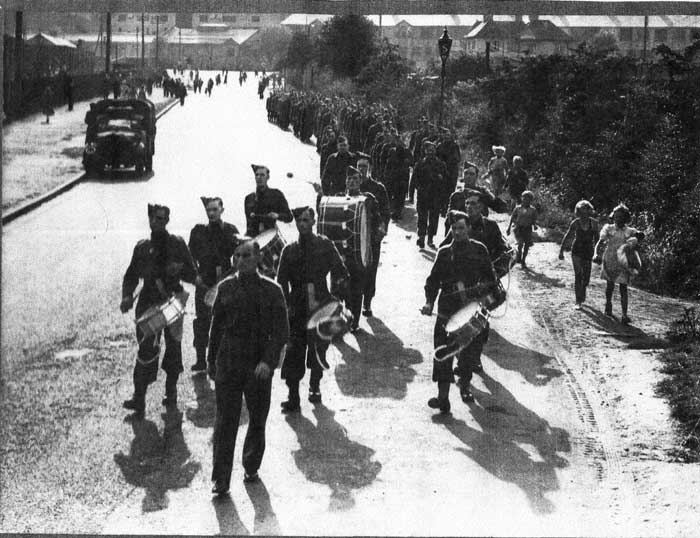
Then in New Street, Rubery.
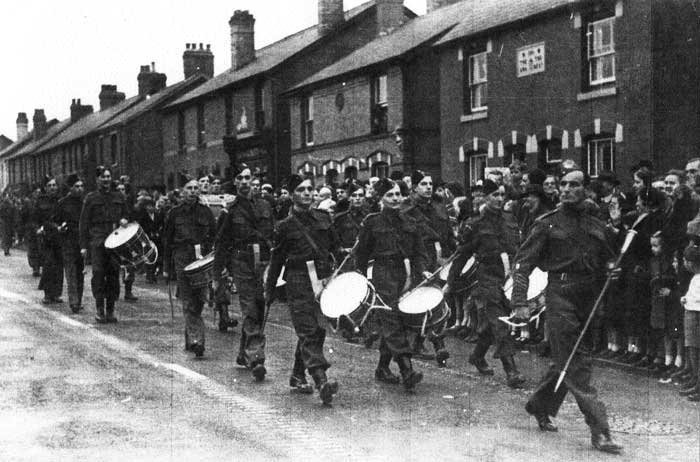
And at a further unidentified location.
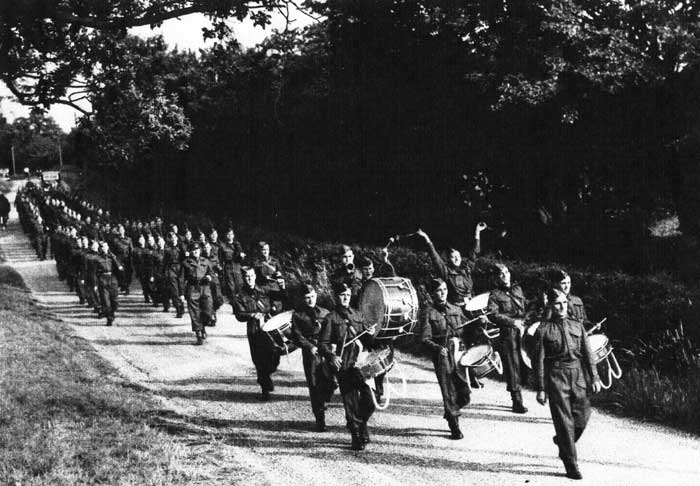
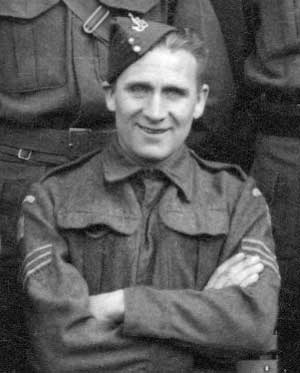 |
Sgt. William David Lovell
(1906-1951), known as Bill
or Billy, was a regular
soldier between 1922, when he
joined up at the age of 16
years, and 1929; he served
with the
South Staffordshire Regiment
in India, Egypt, and the
Sudan. He joined the Home
Guard at the very beginning,
on 4th June 1940, and served
throughout the life of the
service, up to stand-down in
December 1944.
He
was only able to enjoy a few
years of the peace which he
had helped to bring about
and died at the early age of
45.
|
|
Bill Lovell certainly served in the 43rd
Warwickshire and is believed to
have been a member of the
Longbridge unit. There is a
small element of doubt about
this because he is known to
have lived in Sheldon and
worked, at least for a
period, at Metropolitan
Cammell at Elmdon rather
than at Longbridge. But the
Longbridge connection
remains firmly in the family
memory.
Two excellent images
survive of his Home Guard
service. Other than he himself, no
identifications have been
made although there is the
suggestion that an officer
in one of the images is
Lt.-Col. A.F. Lovell,
C.O. of the 43rd Battalion
(but no relation).
The first image below is likely to be the
earlier of the two. Both were taken in the
same location and at the same time of the
year. Some of the men shown are common
to each group including Bill Lovell and the
second-in-command; but not all and the
officer i/c is different. On this
first image, Bill is cheerfully seated in
the front row, third from the right, whilst
two of his comrades seem not yet to have
been issued with their uniforms.
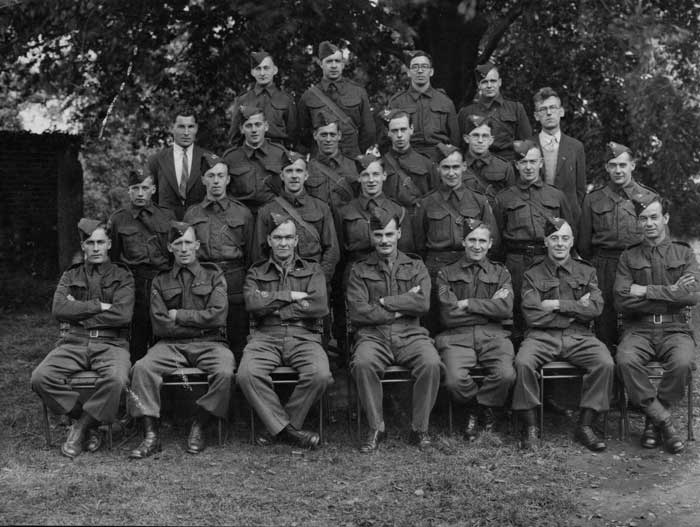
In the second, and probably later, image
Bill Lovell is seated in the front row on
the extreme right.
w700.jpg)
Service in the Home
Guard was recognised after
stand-down in December 1944 by the
King's certificate.
This one
(right)
was issued to
Sgt. William Edward Cooke of the
Works unit.
And it was supplemented
by one issued by the Company and
signed by the Chairman and
Vice-Chairman, E.L. Payton and
Leonard Lord
(below).
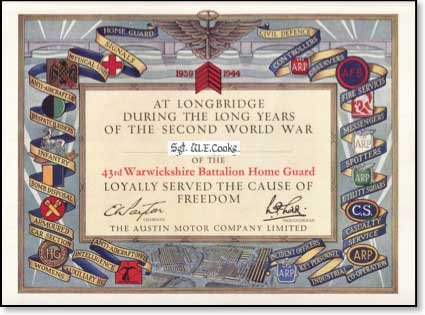 |
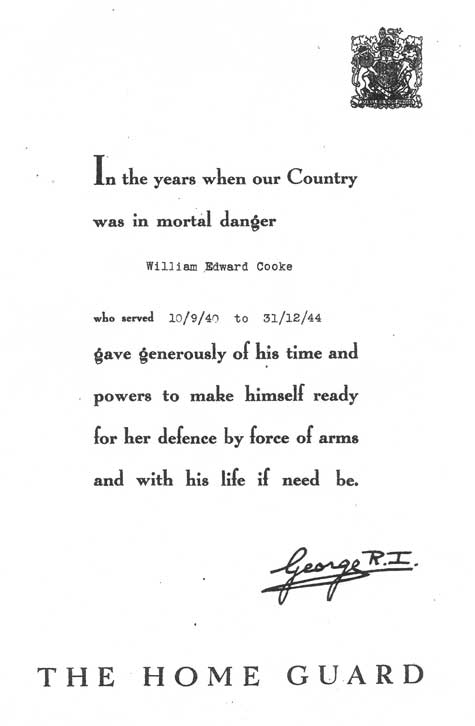 |
The
form of this works
certificate suggests that it was
used for all the various specialised
wartime protective activities
undertaken on the site, not only the
Home Guard but also
ARP, AFS and Casualty Service. The
Home Guard functions and
specialisations shown are
significant in their diversity:
infantry, signals, medical,
anti-aircraft, despatch riders, bomb
disposal, armoured car section,
women's section and intelligence.
And there is similar diversity
in the non-Home Guard activities too:
Defence Controllers, Fire Services,
Messengers, Casualty Services and a
swathe of ARP functions - Observers,
Spotters, Utility Squad, Incident
Officers, Industrial Cooperation etc.)
A surviving further certificate
indicates such non-Home Guard but
equally essential functions. This
certificate was issued to
Mr. George
Barker
(1912-1968)
of Old Hill.
He was employed in the Millwrights Shop
and so was almost certainly present at
the devasting aerial attack of the
afternoon of 13th November 1940 (see
below) which he survived,
apparently unscathed:
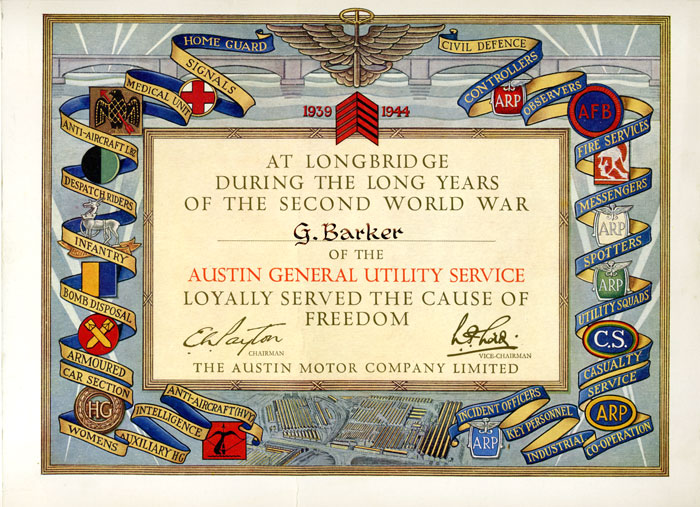
OTHER MEMBERS
OF THE WORKS HOME GUARD UNIT
In addition to Sgt. Cooke
and Sgt. Lovell, other Austin employees known to have
been members of the Works Home Guard unit
include:
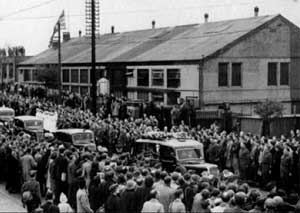 Sydney
Byng
- Corporal Sydney
Byng
- Corporal
Platoon Commander
R.E. Cooke, G.M.
- please see
below
Harry
Vincent Dawson
(1908-2007) - an
upholsterer by trade and of
Cliff Rock Road,
Rednal. He paraded at Lord
Austin's funeral in 1941; the image to the
right shows the cortege leaving the factory.
Just discernible are Home Guards lining the
route.
Ronald William Earp
- possibly on anti-aircraft
duties.
William J. (Mac)
Hardy
(b. 1895)
of
76 Cliff Rock Road,
Rednal,
a wood pattern maker at Longbridge.
Charles William
Jay
- "B"
Company, worked in Aero Works.
Possibly on
anti-aircraft duties before being called up
into the RAF and serving at Stow-in-the-Wold
and Moreton-in-the-Marsh. He later worked at
Rover, Solihull.
Les Mann
Douglas Roy Rubery
- later joined the
Royal Navy.
Platoon Commander R.E. Cooke
was awarded the
George Medal
for an act of outstanding
bravery on 28th October 1940 when he was a
member of F7 (Austin Aero Engine Co. Ltd.)
Company, Birmingham Zone, which became
shortly afterwards one of the constituent
units of the 43rd Warwickshire (Birmingham)
Battalion. Platoon Commander Cooke was
presumably part of the Bomb Disposal Section
(mentioned above) within the Works Unit,
although the incident which led to this
recognition took place off-site and he might
have been more closely associated with
Burman's works unit. The
investiture took place on 29th July 1941 and
a description of the circumstances
surrounding the award reads as follows:
On 28th
October 1940 a 550lb bomb with
delayed action fuse was located at
the factory of
Messrs.
Burman Ltd., Highland Road, Birmingham
and the clock was found to be still
ticking. The bomb had been down for
approximately 45 hours and from
experience an explosion was
considered so imminent as to justify
withdrawal of the working party. An
attempt to remove the fuse failed
and the officers concerned, together
with Cooke, who was present the
whole time, withdrew to consider the
matter.
In view
of the importance of the factory it
was decided to attack the fuse a
second time using a heavy crowbar.
Three people were necessary and
Cooke volunteered to make up the
party. This time the fuse was
partially removed but the ticking
clock and the detonators still
remained intact. It was then decided
to flood the pit in an endeavour to
stop the clock and Cooke's
assistance again proved invaluable
in what turned out to be a
successful operation. The bomb was
safely removed. |
OTHER HOME
GUARD MEMBERS
George Luckman
lived at 5
Jervoise Road, Weoley Castle and
worked at Longbridge, being described in
1939 as a "Motor Vehicle Inspector". He
probably continued to work there throughout
the war on the night shift. It is not so far
known whether George belonged to a Home
Guard unit adjacent to his home or was a
member of the Austin factory unit.
One further
man is known to have served in the 43rd
Battalion. He lived adjacent to the
main works and probably worked there:
Francis John Hudson
(1903-1995)
of 77 Kendal Rise
Road, wife of Winifred Sarah (Gold)
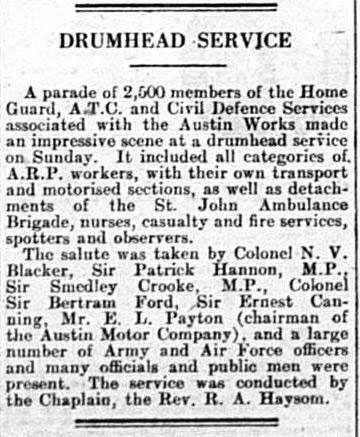
A huge
parade, on an unknown date.
(Grateful
acknowledgement to Matt Felkin) |
|
43rd BATTALION
CASUALTIESAt least three members of the 43rd Battalion
lost their lives in the course of their Home
Guard service:
L/Cpl. William
Alan Russell Fenn
(1922
- 1943) - died 16th April 1943, aged 21. His
family home was in
Much Marcle,
Herefordshire. He now lies in St. Michael's
Churchyard. Cofton.
Vol. Albert Henry
Holt
- died
24th November 1941, aged 37. Married and
living in Moseley. His grave is in
Brandswood End Cemetery.
Pte. Bernard
George Adams
-
died
26th April 1942, aged 31. Married and living
at 82 Mavis
Road, Northfield. He now lies in St. Laurence
Churchyard, Northfield.
The
circumstances surrounding the death of
L/Cpl. Fenn and Vol. Holt are not known, nor
whether they were members of the factory
unit; but
a record of the unfortunate accident
involving Pte. Adams survives, in the form
of two newspaper cuttings.
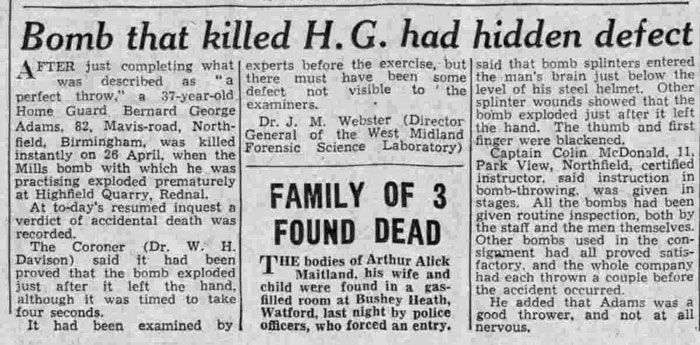
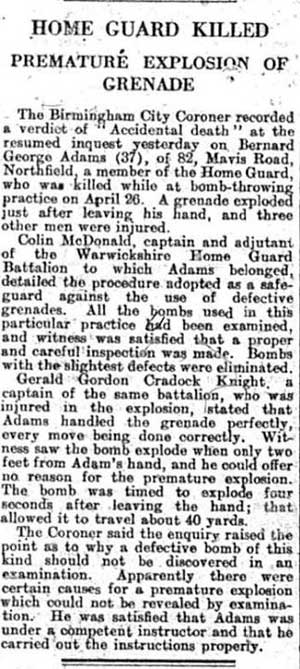 |
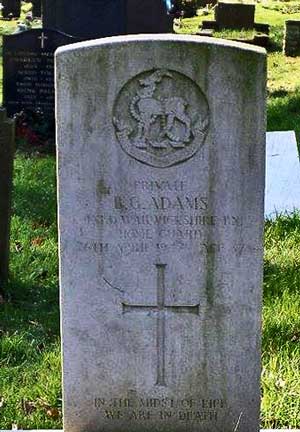
Above is
Pte. Adams's headstone in St.
Laurence churchyard in Northfield.
It is very likely that he was a
member of the factory unit.
|
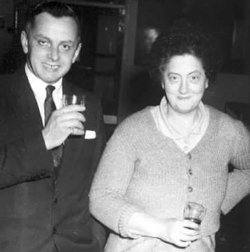
This dreadful accident was almost certainly
witnessed by Bill
Sowton, another member of the factory
unit. William John Hele Sowton, MBE, was
originally from Cornwall but worked at
Austin from 1939 and was living at the time
in Tinkers Farm Road in Northfield, not far
from Pte. Adams in Mavis Road.
His family remembers that he remained
greatly distressed by what had occurred to
his comrade (and possibly personal friend
and work colleague) for the rest of his life
and never wished to talk about it. Bill
(shown
right with his wife in later life)
served as a councillor in Northfield for
many years and, in 1983/4, became Lord Mayor
of Birmingham. He died in 2003 at the age of
89.
AIR RAID
OF 13th NOVEMBER 1940
The Longbridge works was subjected
to remarkably few Luftwaffe attacks.
But the afternoon of Wednesday, 13th
November 1940 saw one with
devastating consequences.
At
4.21 p.m. on Wednesday, 13th
November 1940 a string of seven high
explosive bombs fell on or adjacent
to the site. One of these caused
extensive damage to the Electrical
Repair and Millwrights shop. In that
incident, the following employees
lost their lives:
Harry
Cox
(aged 38)
Alfred
John Draper
(17) - He now
lies in Cofton Hackett churchyard
Daniel
Fox
(37)
Samuel
Richard Lane
(46)
He lived at 42 Ryde Park Road,
Rednal. His grandson writes to
staffshomeguard (June 2015) as
follows:
"Samuel Richard Lane
was my grandfather. He was born in
Birmingham but moved to Yorkshire
prior to the 1911 census. He joined
the army in 1913 and was demobbed,
having been wounded, in early 1918.
In 1940 he is listed on the
electoral roll in Yorkshire so he
must have moved to be part of the
war effort. Not long before her
death, Grandmother said that on the
day he died he asked her to see him
off, so she and my aunt waved him
off down the street. He turned the
corner and came back for a last
wave. My grandmother said it was
strange - he had never done that
before".
Samuel Richard Lane's legacy
continues to survive, far into the
future: on 6th January 2016
Samuel David Lane was born in
Leeds to Raymond & Vikki Lane taking
his great-great-grandfather's name.
Hubert
Overend
(43)
Adrian
John Vicary
(20)
Five more
men were seriously injured including
James
Green (who lost a leg),
William
Maddox,
Fred
Charles Stead and
Sidney
Thomas Worthing. A further
fifteen were slightly wounded.
There was probably a further
victim of the same attack,
Arthur
Grant:
Arthur Grant
aged 26, of
111
Nuthurst Road, Cofton Hackett
(and originally from Birkenhead),
died on the same day. He was
described as an "aero assembler
fitter" and therefore almost
certainly worked either on the
Longbridge site or that of the
nearby Austin shadow factory at
Cofton Hackett. His death
certificate states that his death
was due to enemy action and the
place "a field in Cofton Hackett".
He was clearly caught out in the
open, either by a further bomb from
the stick which fell across the
Longbridge site or from a machine
gun attack which is rumoured to have
occurred at the same time. Another
rumour states that a man lost his
life in
Cofton Park "as he
was walking home from work at the
Austin". No further details have so
far emerged of the circumstances
surrounding this tragedy, including
where Arthur is buried. We
commemorate the name of Arthur Grant
on this page as a further victim of
the Luftwaffe attack of 13th
November 1940.
It is not know whether any of
these men were members of the
factory Home Guard. But their
colleagues in the latter,
together with the other emergency
services of ARP, CS and AFS,
mentioned above, would by the autumn
of 1940 have been well trained and
ready; and would have been
heavily involved in the aftermath of
the attack. |
|
ACKNOWLEDGEMENT
is gratefully made to Keith Woodfield for
providing much of the information on this
page.
Grateful acknowledgement is also made
to other sources of information not
specifically mentioned above:
to the
Birmingham Air Raids Remembrance
Association through whose good
offices Birmingham air raid casualties can be
researched; to John Baker's
Austinmemories website; to the
www.home-guard.org.uk website which,
amongst much else, lists all Home Guard
bravery awards; to David Lovell for the
information concerning his father, Bill, and
for the two group images; to Matt Felkin and
members of his
"Wartime
Birmingham and the Blitz" Facebook page
and especially Maggie Laity; to Linda Ryland
for information about her father, Charles
William Jay; to
Derek Sowton for the information about his
father; to Peter Dorgan for information
about Arthur Grant; to John Dawson, Mrs. Evelyn Jones
and Mrs Janet Sly for information on Messrs.
Dawson and Hudson; to Margaret Sheridan
for information about her father, George
Luckman; and to Martin Barker for his father's
WW2 Certificate.
(Lovell group images ©
David Lovell 2015; Headstone images © Maggie
Laity 2015-2017; Sowton image © Derek Sowton 2015:
Main group image © John Dawson 2018).
FURTHER
INFORMATION
Further information about the
Warwickshire battalions is contained
elsewhere in various parts of this website. To view the
Warwickshire summary page, please use the
Memories-Warks link below.
And if you
can add to the history of the Austin Home
Guard, please contact staffshomeguard via the
Feedback link. |
x117 April 2015,
updated November 2015, May 2017, September 2017, April
2018, November 2018, June 2023 |
|